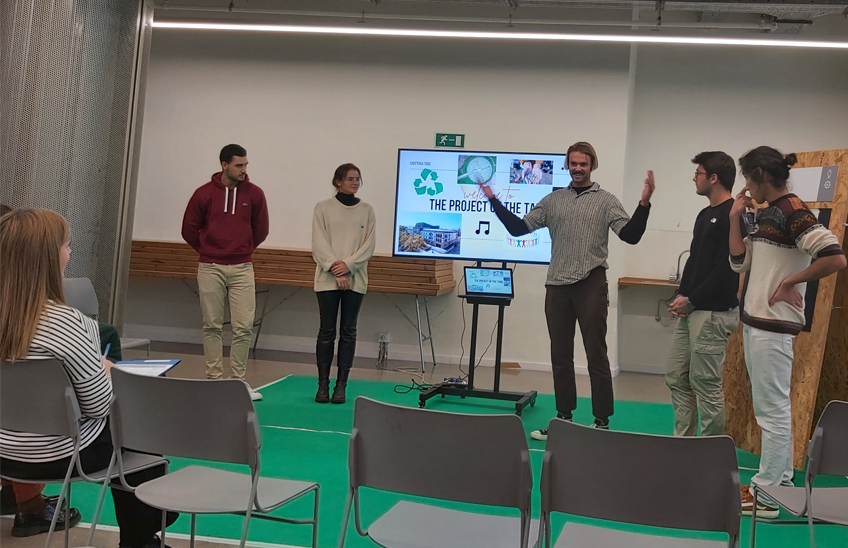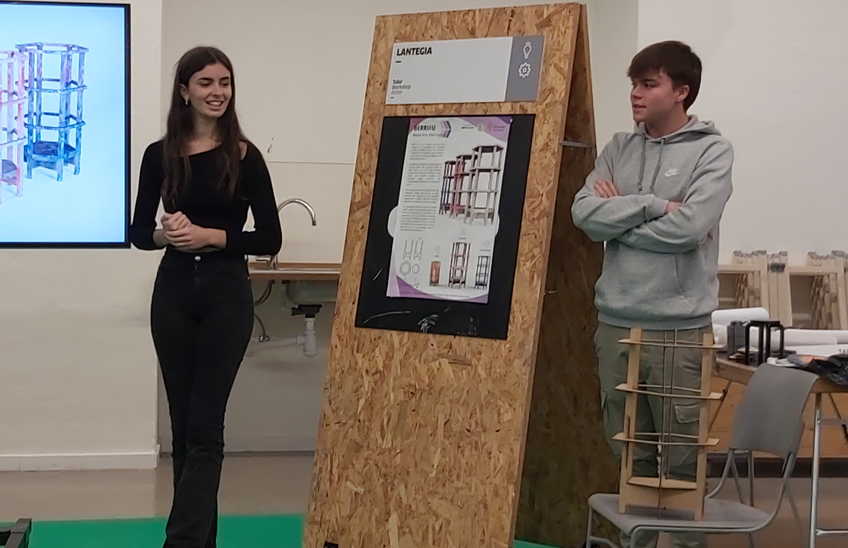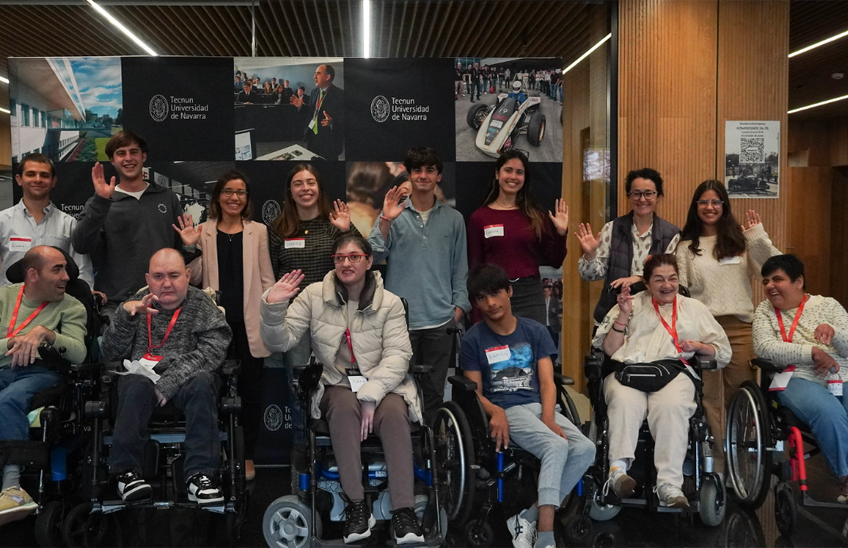"The goal of our challenge was to try to make Tabakalera an even more sustainable place."
The student Lucas García-Rosado Correia, student of 3rd year of Degree of Engineering of design Industrial and development of New Products, tells about the creative challenges that the studio design Mazedonia, located in Tabakalera, has proposed to them.

12 | 12 | 2022
Seven teams made up of five 3rd year students of the Degree from design Industrial Engineering and development of New Products have taken part in a creative challenge proposed by the studio of design Mazedonialocated in Tabakalera. The student Lucas García-Rosado Correia tells what his project consisted of.
What was the challenge for Mazedonia in which you participated?
The challenge has focused on Mazedonia, a studio of design that designs products and conducts workshops in the Medialab of Tabakalera to show the plastic recycling process sharing the creative process with citizens. In my case I worked with Labe, a laboratory of innovation and digital transformation for the gastronomy of the future that includes among its facilities a restaurant serving local food, always trying to innovate in a sustainable way and create value for the gastronomy sector. The goal of our challenge was to try to make Tabakalera an even more sustainable place. We divided up the different entities that make up the Tabakalera ecosystem and looked for a way to reuse the waste they produced and design solutions with them that at the same time would be beneficial for Tabakalera. In the case of my group we created different types of bioplastics based on the organic subject produced in Labe. And with them we proposed to create coasters and tablecloths that could be used in the restaurant itself and raise awareness among customers about the importance of circular Economics .
What have you learned from him?
In my team we have mainly learned things related to bioplastics. This was an area we hadn't talked much about on class. Thanks to this project we have been able to learn how to create them. In addition, we have experimented with different organic wastes, developing prototypes with different types of bioplastics and production processes for these materials. From an orange one with vanilla essence, to one with potato peelings. Each group has been able to learn from their waste and different materials that can be manufactured from them and generate ideas about functional products that solve real needs and at the same time generate awareness about the Economics circular in their future users.
What was involved in working as a team to make it happen?
By working as a team we have been able to develop a more complete project . By pooling our opinions and being critical of each other we have been able to come up with a very interesting result . The different points of view have been beneficial for the final submission .
How was presentation at Tabakalera?
The presentation in Tabakalera was a plus for the project. This is a place that gives you the feeling of familiarity. Anyone can go, there are people talking, strolling, children, etc. Even in parts of the presentation a couple of strangers sat interested to see what we were talking about. It was nice to see that the Tabakalera team was interested in our project and even gave us their opinions about it.
The design Mazedonia studio
The design Mazedonia is founded by three graduates of Tecnun who, after traveling halfway around the world and acquiring very interesting professional experiences, returned to San Sebastian to create their own studio and, among many other activities, are collaborating with Tabakalera to promote citizen workshops in which they take part of the network Precious PlasticsThey are working with Tabakalera to create open source machinery and products in the field of plastic recycling. They currently have a laboratory with these machines in the Tabakalera facilities. average Lab Tabakalera.
Tabakalera Medialab
For her part, Arantza Mariskal Balerdi, manager of Tabakalera Medialab points out that Medialab is a service open to the public in which "we promote and facilitate learning processes, creation of knowledge, experimentation and development of projects. It is in this framework where we welcomed Tecnun students who, guided among others by the components of the open group of Precious Plastic of Medialab, presented projects with the goal to bring improvements in various areas and frameworks of work of Tabakalera, from proposals for the creation of toys to experimentation with food waste through proposals for contributions to improve the quality of experiences in the exhibition halls".

Mariskal highlights that "we could appreciate quality in the results presented by the students, in which we observed a good level of technical knowledge , design and imagination in the elaboration of proposals and solutions. Let's hope that this small partnership between both institutions can continue so that we can think of possible cooperation proposals between Medialab and the University as another element in the training of our young people".
Each Tecnun team has chosen a different entity of Tabakalera and have made research field with the tools learned in the subject to identify the waste generated by each one and the needs they may have. Once these two aspects are clear, they have developed a creative process with the ideation and idea selection tools they learn at subject to generate product concepts that use some of the identified waste as materials and that can solve some of the needs found. Being engineers from design they also have to analyze the feasibility of manufacturing these products and they are also asked to make a prototype to scale in order to show their concept.
The event in Tabakalera took place a few days ago and the final works of Tecnun students were presented. The goal of the event was to be able to show all the entities that have collaborated in the project their results. "For the students the fact of presenting the result of their work in Tabakalera has been a great motivation because leaving the university and seeing that their projects generate real interest in entities of their city and can solve needs of different groups makes them better understand the social impact of their future work", highlights the professor of the subject, Mabel Rodriguez, who accompanied the students during the presentations in Tabakalera, and of course, throughout the ideation of the challenges and the realization of each of the works.




